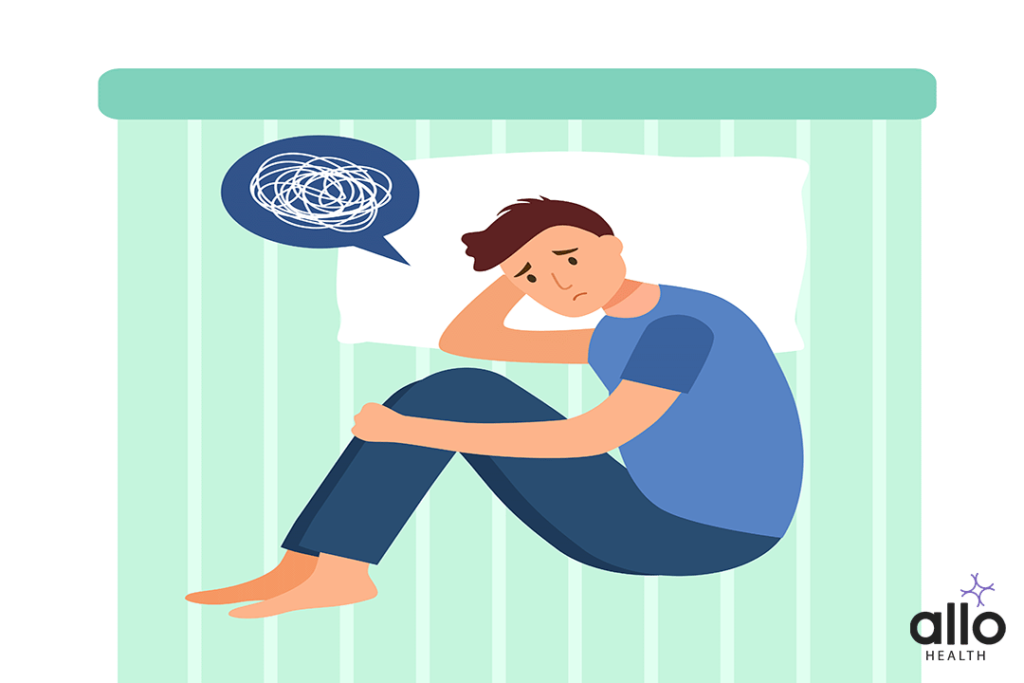Masturbation And Libido

Allo Health is dedicated to personalized well-being, offering support and trusted information tailored to individual health goals. The platform emphasizes human-generated content, led by a distinguished medical team of experts, including physicians and sexual health specialists. Their commitment to credibility involves rigorous fact-checking, authoritative research, and continuous updates to ensure accurate, up-to-date information. Allo Health's unique approach goes beyond conventional platforms, providing expert-led insights and a continuous commitment to excellence, with user feedback playing a crucial role in shaping the platform's authoritative voice.

A Psychotherapist with Clinical specialization, working for over seven years now. Areas of specialization range from Anxiety-related disorders, Mood-related disorders, Personality disorders, Sexual dysfunctions & other mental health issues.
Why This Was Upated?
Our experts continually monitor the health and wellness space, and we update our articles when new information became available.
Updated on 03 June, 2024
- Article was updated as part of our commitment to diversity, equity, and inclusion.

"The following blog article provides general information and insights on various topics. However, it is important to note that the information presented is not intended as professional advice in any specific field or area. The content of this blog is for general educational and informational purposes only.
Book consultation
The content should not be interpreted as endorsement, recommendation, or guarantee of any product, service, or information mentioned. Readers are solely responsible for the decisions and actions they take based on the information provided in this blog. It is essential to exercise individual judgment, critical thinking, and personal responsibility when applying or implementing any information or suggestions discussed in the blog."
How Does Masturbation Affect Your Sex Life?
Masturbation is a common practice that is carried out by individuals of all ages and genders. It is a self-stimulatory act that can result in sexual arousal and orgasm. However, there has long been a debate about how masturbation affects a person’s sex life. Some people believe that excessive masturbation can lead to sexual dysfunction, while others argue that it can enhance one’s sexual experience. Let’s delve into the topic and explore how masturbation affects an individual’s sex life.
How does masturbation affect sexual health?
Masturbation has numerous benefits when it comes to sexual health. It is a natural way to explore one’s body and sexuality. When an individual masturbates, they learn about their body and what they like. This knowledge can help improve their sexual experience with a partner. Masturbation is also a safe way to meet one’s sexual needs without risking sexually transmitted infections (STIs).
Masturbation has been shown in studies to improve sexual function in both men and women. In men, a certain masturbation technique has been linked to improved erectile function and can help delay premature ejaculation. In women, masturbation can help increase lubrication and improve sexual arousal.
Excessive masturbation, on the other hand, can be harmful to one’s sexual health. Masturbation on a regular basis in men can lower testosterone levels, resulting in sexual dysfunction such as erectile dysfunction and a decrease in sex drive. In women, excessive masturbation can lead to vaginal irritation and may cause difficulty in achieving orgasm during partnered sex.
How does masturbation affect sexual relationships?
Masturbation can have both positive and negative effects on sexual relationships. On one hand, masturbation can help improve sexual function and knowledge of one’s body, which can enhance sexual experiences with a partner. It can also be a healthy way to release sexual tension, which can help reduce stress and anxiety.
However, excessive masturbation can lead to concerns in sexual relationships. When an individual masturbates excessively, they may lose interest in partnered sex or find it difficult to achieve orgasm with a partner. This can cause tension and frustration in the relationship.
Furthermore, if one partner in a relationship masturbates frequently, it can lead to feelings of neglect or rejection in the other partner. Communication is key in any sexual relationship, and discussing one’s masturbation habits can help avoid misunderstandings and ensure that both partners are satisfied.
Masturbation can have an impact on an individual’s sexual health and relationships in both positive and negative ways. While it is a natural and healthy way to explore one’s sexuality, excessive masturbation can lead to sexual dysfunction and concerns in sexual relationships. It is important to find a balance that works for each individual and to communicate with partners about one’s sexual habits and needs.
Understanding Libido
Libido is an important aspect of human sexuality, and understanding it can help individuals maintain healthy sexual relationships. We will also provide references to scientific studies and resources to help readers gain a better understanding of this topic.
What is libido?
Libido refers to a person’s sexual desire or drive. A person’s level of sexual desire is determined by a complex interplay of biological, psychological, and social factors. It is influenced by a range of factors, including hormones, stress, medication, and social and cultural attitudes towards sex.
How does libido work?
Libido is regulated by a complex interplay of hormones, neurotransmitters, and other chemicals in the brain and body. One of the primary hormones responsible for libido in both men and women is testosterone. However, testosterone’s role in sexual desire is complex and influenced by a variety of other factors such as age, health, and social factors.
Other neurotransmitters, such as dopamine and serotonin, are involved in the regulation of libido. Dopamine is associated with reward and pleasure, and it is released in response to sexual stimulation. Serotonin, on the other hand, is linked to mood regulation, and low serotonin levels have been linked to low libido.
Psychological factors can also influence libido, including stress, anxiety, and depression. Stress, in particular, can affect libido by increasing levels of cortisol, which can interfere with the body’s natural hormonal balance.
What factors affect libido?

A range of factors can affect libido, including:
- Hormonal imbalances: Hormone imbalances, such as testosterone, oestrogen, and progesterone, can affect both men and women’s libido.
- Age: Libido typically decreases with age, though this varies depending on a variety of factors such as health and lifestyle.
- Medication: Antidepressants and blood pressure medications, for example, can have an effect on libido.
- Psychological factors: Stress, anxiety, and depression can all have an impact on libido.
- Lifestyle factors: Poor diet, lack of exercise, and drug and alcohol use can all have an impact on libido.
- Relationship factors: A person’s libido can be affected by the quality of their relationship with their partner.
Libido is a complex interplay of biological, psychological, and social factors that determine a person’s level of sexual desire. It is influenced by a range of factors, including hormones, stress, medication, and social and cultural attitudes towards sex. Understanding libido can be a difficult process, so if you are concerned about your libido, seek the advice of a healthcare professional. By understanding the factors that can affect libido, individuals can take steps to maintain healthy sexual relationships.
Masturbation And Libido: The Link
There is some debate about the link between masturbation and libido. Some people believe that masturbation can decrease libido by desensitizing the genitals and reducing sensitivity to sexual stimuli. Others argue that masturbation can increase libido by allowing individuals to explore their sexual desires and become more comfortable with their bodies.
A study published in the Journal of Sex Research discovered that masturbation frequency was positively correlated with sexual desire in women. The study surveyed over 800 women and found that those who masturbated more frequently reported higher levels of sexual desire and arousal. This suggests that masturbation can have a positive impact on libido for some individuals.
Another study published in the Archives of Sexual Behavior discovered that men who masturbated frequently had higher levels of sexual desire and arousal. Over 400 men were polled for the study, and those who masturbated more frequently reported higher levels of sexual desire, arousal, and erectile function. This suggests that masturbation may also have a positive effect on male libido.
Correlation between masturbation and libido
While there is evidence to suggest a link between masturbation and libido, it is important to note that correlation does not always imply causation. To put it another way, just because masturbation and libido are linked does not imply that masturbation causes an increase or decrease in sexual desire.
Stress, fatigue, medication, hormonal changes, and relationship concerns can all have an impact on libido. Higher libidos may also be more likely to masturbate than lower libidos.
Does Masturbation Increase Or Decrease Sex Drive?
Masturbation has long been a source of contention. Many people regard it as a healthy and natural way to explore their sexuality, while others regard it as a dangerous and religiously sinful practise. One of the most frequently asked questions in masturbation discussions is whether it affects a person’s sex drive.
There is no clear answer to this question because research on the relationship between masturbation and sex drive is mixed. Masturbation has been shown in some studies to increase sexual desire while decreasing it in others. Let’s take a closer look at the evidence.
Evidence Supporting Increased Sex Drive
According to one study, men who masturbated frequently had higher levels of testosterone, a hormone associated with increased sexual desire. The researchers suggested that regular masturbation may stimulate the production of testosterone, leading to an increase in sex drive.
Another study found that masturbation can improve sexual function and satisfaction in both men and women. The researchers suggested that this may be due to the fact that masturbation helps people become more comfortable with their own bodies and their sexual desires.
Evidence Supporting Decreased Sex Drive
On the other hand, some studies have found that masturbation can decrease sexual desire. One study found that men who masturbated frequently were more likely to report lower levels of sexual desire and arousal during partnered sexual activity.
Another study discovered that excessive masturbation can cause sexual exhaustion, a condition characterised by decreased sexual desire, erectile dysfunction, and fatigue. The researchers suggested that this may be due to the depletion of neurotransmitters and hormones that are involved in sexual function.
So, does masturbation boost or deplete sex drive? The answer is not simple. While some research indicates that masturbation can increase sexual desire by increasing testosterone production and improving sexual function and satisfaction, other research indicates that it can decrease sexual desire by causing sexual exhaustion and depleting neurotransmitters and hormones.
It’s important to note that the effects of masturbation on sex drive differ from person to person. Masturbation may increase or decrease sexual desire in some people, while it may decrease it in others. Finally, paying attention to your own body and sexual responses is the best way to determine how masturbation affects your sex drive.
Masturbation And Libido: Hormones Involved
Masturbation and libido are intimately linked to the endocrine system, which is in charge of hormone production and regulation. Hormones are chemical messengers that play an important role in sexual function and behaviour, such as desire, arousal, and orgasm.
Testosterone
Testosterone is a male sex hormone that is also present in women in smaller amounts. It is primarily produced in the testes in men and the ovaries in women, but the adrenal glands also contribute to its production. Testosterone is responsible for the development of male sexual characteristics, including the growth of body hair and muscle mass.
Testosterone is also important for sexual desire and arousal. Low testosterone levels have been linked to lower libido in both men and women, while high testosterone levels have been linked to increased sexual desire and activity.
Estrogen
Estrogen is a female sex hormone that is primarily produced in the ovaries. It is responsible for the development of female sexual characteristics, including the growth of breasts and the regulation of the menstrual cycle.
Estrogen also plays a role in sexual desire and arousal. Women with low estrogen levels may experience a decrease in libido and vaginal dryness, whereas women with high estrogen levels may experience an increase in sex drive.
Dopamine
Dopamine is a neurotransmitter that plays a role in reward and pleasure. It is released in the brain during sexual activity and is associated with feelings of pleasure and satisfaction.
Dopamine is also involved in the brain’s reward system, which reinforces sexual behavior. The more dopamine is released during sexual activity, the more likely a person is to engage in that behavior again.
Oxytocin
Oxytocin is a hormone that is released during sexual activity and is associated with bonding and intimacy. It is sometimes called the “love hormone” because it is released during activities like hugging, cuddling, and orgasm.
Oxytocin is also involved in the contraction of the uterus during childbirth and the release of breast milk during lactation.
Prolactin
Prolactin is a hormone that is primarily associated with lactation in women. However, it is also released during sexual activity and is believed to play a role in sexual satisfaction and orgasm.
Prolactin levels increase after orgasm, which may explain why men experience a refractory period after ejaculation, during which they are unable to achieve another erection or orgasm.
Serotonin
Serotonin is a neurotransmitter that regulates mood, among other things. It also plays a role in sexual function, specifically in the regulation of ejaculation.
Low serotonin levels have been linked to premature ejaculation, whereas high serotonin levels may delay ejaculation and prolong sexual activity.
Hormones influence sexual health and behaviour, including masturbation and libido. Sexual desire and arousal are controlled by testosterone and oestrogen, while pleasure and satisfaction are controlled by dopamine, oxytocin, prolactin, and serotonin.
Sexual health is as important as physical and mental health. In most cases, one consultation can go a long way. Personalised, discreet, and judgement-free treatment at your fingertips – book an online consultation with one of Allo?s leading experts.












































